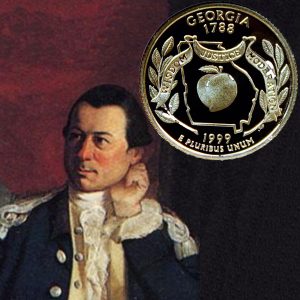Today, the Georgia State Quarter Coin remembers the overthrow of Governor Wright and the election of Archibald Bulloch as president of the Provincial Congress on January 22, 1776.
From the History of Savannah, Georgia, From Its Settlement to the Close of the Eighteenth Century by Charles Colcock Jones, published in 1890:
=====
The arrival at Tybee, on the 12th of January, 1776, of two men-of war and a transport from Boston, with a detachment of royal troops under the command of Majors Maitland and Grant, cheered the loyal yet despondent heart of Governor Wright, and encouraged the hope that by force of arms the dominion of the king might soon be reestablished in Georgia.
Six days afterwards, in view of the impending danger, to strengthen the independent temper of the inhabitants, and to demonstrate most emphatically that royal rule in the province was at an end, the Council of Safety resolved “that the persons of his Excellency Sir James Wright, Bart., and of John Mullryne, Josiah Tattnall, and Anthony Stokes, Esqrs., be forthwith arrested and secured, and that all non-associates be forthwith disarmed except those who will give their parole assuring that they will not aid, assist, or comfort any of the persons on board his Majesty’s ships of war, or take up arms against America in the present unhappy dispute.”
With a party selected by himself, Major Joseph Habersham volunteered to secure the person of the governor.
Proceeding to the residence of the chief magistrate, who was at the moment in conference with his council, Major Habersham, passing the sentinel at the door, entered the hall, and advancing to the governor and placing his hand upon his shoulder, said, “Sir James, you are my prisoner.”
Astonished at the bold and unexpected act, the members of council and friends to the Crown there assembled fled precipitately from the house.
Having exacted a solemn promise from the governor neither to depart from Savannah nor to hold any correspondence with the officers and soldiers on the ships lying in Tybee Roads, Major Habersham suffered him to remain in his mansion.
A guard was posted to keep watch upon his movements, and to prohibit all intercourse with members of council, Crown officers, or persons deemed inimical to the cause of America.
Of the bravery of this act too much cannot be said in commendation. The personal courage displayed in making the arrest, pronounced as it was, will be reckoned but as a trifle when contrasted with the moral heroism involved in openly defying the power of the realm and in humbling the duly appointed representative of the Crown in the face of the province he was commissioned to rule.
The effect was dramatic, startling.
Wearied with his confinement, mortified at his situation, and harassed by dangers, some of them arising from shots wantonly fired into his dwelling, Governor Wright effected his escape on the night of the 11th of February.
Slipping out of the back part of his house, he reached the river, and thence descended to Bonaventure where his friend Mullryne resided.
There a boat and crew were in waiting, and he was conveyed through Tybee Creek to the armed ship Scarborough, Captain Barclay, lying in the mouth of the Savannah River. He was received on board at three o’clock on the morning of the 12th.
The following day he penned a letter to James Mackay and other members of the king’s council remaining in Savannah, in which, “as the best friend the people of Georgia have,” he counseled an immediate return to peace and security under royal protection, exhorted the inhabitants to save themselves and their posterity from impending ruin and destruction, cautioned them to desist from their present plans, promised on his return to England to intervene in their behalf if they exhibited signs of penitence and craved pardon, and warned them against a continuance of their disloyalty.
The warnings and the threats of the fugitive governor were disregarded.
His persuasions from the cabin of the Scarborough brought a smile to the countenances of those who had feared not his menaces while still the king’s governor resident in Savannah.
The “Sons of Liberty” had proceeded too far to think of pause or to cry for pardon.
The public voice was for liberty, and the general mind counseled resistance.
The olive branch was extended in vain.
As a matter of courtesy the Hon. Archibald Bulloch, president of the Provincial Congress, responded to the communication.
His reply was satisfactory neither to the governor nor to Captain Barclay. The former said he could not consider it as an answer because no notice was taken of his advice and proffer of service to the colony.
“However,” he added, “if Georgians will not be their own friends, the province will blame them and not me who through friendship put it in their power to be happy.”
The Provincial Congress which assembled in Savannah on the 20th of January, 1776, was organized on the 22d by the election of the Hon. Archibald Bulloch as president.
On the 2d of February Archibald Bulloch, John Houstoun, Lyman Hall, Button Gwinnett, and George Walton were appointed delegates to the Continental Congress.
Of the five delegates thus selected, the signatures of three—Hall, Gwinnett, and \Val ton—were affixed to the Declaration of Independence.
=====
The Georgia State Quarter Coin shows with an image of Archibald Bulloch, circa 1775.
